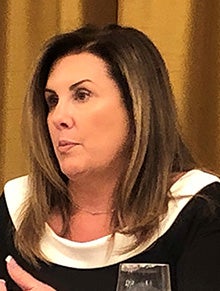What happens when a Florida university principal preparation program, three local school districts, the state’s education agency and others make a commitment to work together to improve the way future school leaders are trained?
An explosion of ideas, tough work and innovation—if a lively panel discussion at a recent Wallace gathering is to be believed.
The meeting brought together participants in the Wallace-sponsored University Principal Preparation Initiative. The effort is centered at seven universities around the country that are seeking to redesign their principal prep programs to ensure that they help shape professionals ready for the demands of the often difficult jobs awaiting them, especially in high-needs schools. A centerpiece of the initiative is that the universities are revamping their programs in close partnership with other key players: school districts that hire their graduates; state agencies that determine accreditation and other policies influencing university programming; and “mentor” programs, preparation programs that bring special expertise to bear on redesign.
The panel highlighted the work of Florida Atlantic University and its partners. Moderator Steve Tozer, professor of educational policy studies at the University of Illinois-Chicago, opened by making clear the stakes of the endeavor. “This initiative is based partly on fact that superintendents and universities alike are feeling the need to improve how we do principal preparation nationwide,” he said, along with a recognition that “if we don’t do better it’s going to make it much harder to expect improved learning outcomes for our kids in schools.”
Daniel Reyes-Guerra, a professor and director of the initiative at Florida Atlantic, outlined the many changes in programming that have taken place at his university since the redesign got under way about two years ago. Among other things, there are now close links between university and district in everything from program admissions to course content to the required practical leadership experiences students receive in schools. Driving the changes, Reyes-Guerra said, is this question: “How do we go from the university doing their thing, the districts doing their thing … [to] producing the kind of leader that these districts want?”
One of the partner districts is Broward County, and another panelist, Ted Toomer, director of leadership development for that county’s school system, said that constant, open communications—including weekly video chats among the partners—had been an essential to making the “deep, messy work” of change possible. “Having everybody around the table talking about the work has been a major, major benefit,” he said.
 Annmarie Dilbert, principal of Crosspointe Elementary School in Palm Beach County, another of the partners in the Florida effort, spoke about the role of mentoring would-be principals in preparation programs. Based on less-than-optimal mentoring she had seen in her career, Dilbert was inspired to join Florida Atlantic’s new approach this fall. Dilbert, like other principals taking part, acts as a mentor to a teacher in her own school. It’s a major commitment, she said, but Dilbert has been gratified by “the growth that I have seen in her—as well as myself.” She has hopes for the future, too. “I’m seeing results and I’m only one semester in,” Dilbert said.
Annmarie Dilbert, principal of Crosspointe Elementary School in Palm Beach County, another of the partners in the Florida effort, spoke about the role of mentoring would-be principals in preparation programs. Based on less-than-optimal mentoring she had seen in her career, Dilbert was inspired to join Florida Atlantic’s new approach this fall. Dilbert, like other principals taking part, acts as a mentor to a teacher in her own school. It’s a major commitment, she said, but Dilbert has been gratified by “the growth that I have seen in her—as well as myself.” She has hopes for the future, too. “I’m seeing results and I’m only one semester in,” Dilbert said.
In joining the initiative, state education officials have seen that the state, too, could have a substantial role to play in the cultivation of effective principals. Paul Burns, deputy chancellor for educator quality at the Florida Department of Education, said the initiative had spurred the establishment of a task force to examine the status of education leadership in the Sunshine State. Composed of representatives from a number of institutions with a stake in effective school leadership—from school teachers and prep program faculty members to principals, school boards, unions and others—the task force has examined, among other things, the extent that state policies and standards support effective leadership.
The idea, Burns said, is “to begin to dig deeply into this notion of educational leadership for the state of Florida—what it looks like, what our needs are, what our gaps are, to begin to identify what was going well.” A report on their findings is being finalized now, Burns said after the panel.
You can watch the full panel discussion here and see the latest findings from the University Principal Preparation Initiative here.



